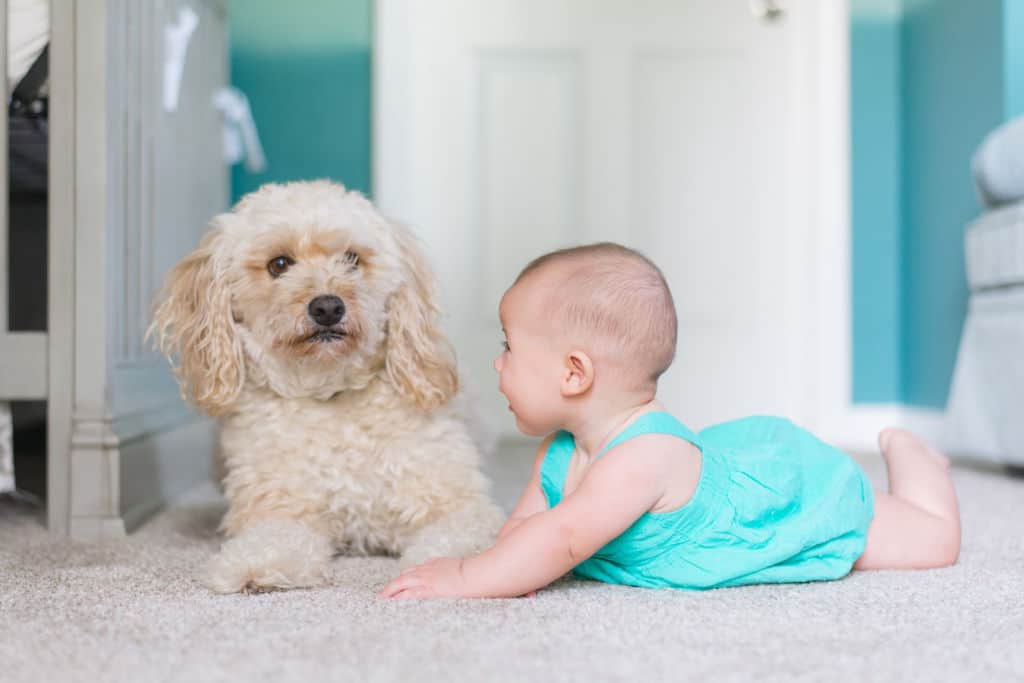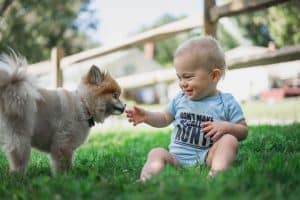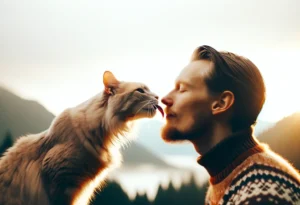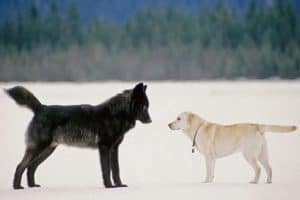We often see how curiously dogs act around babies by protecting or licking them. Some of these things are fine, but others can be dangerous. Why are they so drawn to newborns?
Cats are typically drawn to babies at first because it is something new to explore, a new scent to check out. On the other hand, dogs are attracted to babies because of their instinct to welcome a new pack member. While these are typical behaviors, it doesn’t always go this way.
Dogs are usually protective of newborns, while cats tend to sniff, explore, then go away. However, they all have personalities and will depend on the animal, their training, and their environment.

Why Do Dogs Like Babies?
Some canines have an inherent mother instinct. Dogs are also drawn to them because they drool, spit out food, and drop crumbs everywhere. Dogs can detect a link between them and their owners if children are present and often intuitively seek to safeguard the family’s youngest member.
However, many dogs do not get along with newborns and find the noises/smells/movements quite upsetting. Not every dog gets along well with children.
You must exercise caution because some dogs become frightened due to toddlers’ unpredictable movements and may snap or bite in terror. Children at that age do not understand the signals given by dogs and will continue pursuing, grabbing, or otherwise pestering the dog, which can also result in an attack.
My dog avoids babies and toddlers. They are pretty cautious around them if they need to walk by them. They prefer older children since they always play with them, petting or feeding them.
While most dogs love kids, some dogs are scared of youngsters and are unsafe in their presence. Owners should not expect dogs to love and tolerate children instantly, and children should be taught to be courteous and gentle with dogs.
Why Do Cats Like Babies?
Children are novel, unique, and fascinating. Your cat is interested and wants to explore in every way. Cats are drawn to the warmth of a crib, whether or not a baby is there. Some cats aren’t that interested. For example, our cats were and still are entirely uninterested in babies.
Our cats didn’t even notice our son until he started crawling after them. They simply move away from him at that time. You must be familiar with your cats and how they may react to crying, hair-pulling, and other behaviors.
In my experience, cats usually smell babies and avoid laying next to them, but cats aren’t actually dangerous if they’re like that because they’ll get startled if the baby cries. Always make sure that the infant naps in a cat-free environment.
Do Dogs and Cats Protect Human Babies?
Dogs are pack animals and consider their family to be their pack. As a result, a new baby usually means a new puppy in the pack. Dogs, like us, are sensitive pack animals. They, too, have mammalian instincts to defend.
However, this is not true of all dogs. Some are jealous and will guard certain things/people in the house, while others are territorial. When a new infant is brought into the home, some dogs who were never territorial or had any behavioral issues will develop them. It is critical to prepare your dog well in advance.
Dogs typically recognize the baby as a young human. Most dogs are quite tolerant of puppies and understand that they need to be safeguarded because they fall down a lot and aren’t sturdy, so the same goes for newborns.
We don’t know if they can envision a future in which those babies will be grownups. And we’re not sure they’re aware that the new baby in the house is the offspring of its two owners. They acknowledge, however, that newborns are delicate beings in need of care and protection and have particular behaviors allocated for babies.
While some newborns may be sensitive, growing up with dogs may help youngsters avoid allergies, according to studies. One study found that exposing a child to various pets (cats or dogs) during the first year of life could lessen the chance of multiple allergy reactions at the age of six or seven.

Some people claim that a cat will pee on a baby, although in most cases, a cat peed on an infant’s belongings due to territorial issues. You can avoid these problems by adopting a more cat-friendly approach toward nursery areas and acclimating your cats ahead of time to some of the new sights, sounds, and scents appearing in their territory.
It is crucial to note, however, that dogs are not always cautious around babies. It is irresponsible to leave a baby alone with a dog, and many little children have been injured. While babies love dogs and will often laugh at them, supervision is crucial.
One of my cats is not fond of babies, toddlers, or youngsters. But he’d never tried to hurt my son. Any harm was done in self-defense. They are all unique, just like us. Before striking with claws or teeth, some will let a child do practically anything. Some choose to run instead.
The most important thing to remember is that you should never leave a newborn alone with any animal. All young children should be taught how and when to touch a dog or a cat.
Should You Let Your Pets Lick Your Baby?
Dogs lick everything, and it’s usually not worth letting them lick a baby. Because babies lack a proper immune system, a dog licking or being close to them is potentially dangerous for the baby.
Dogs’ lips aren’t entirely clean. They have the same bacteria in their mouths as we do, so even if we aren’t eating poop outside or licking our bottoms, our mouths are filthy as theirs.
If your dog is already licking your infant, it is typically safe unless you are concerned that bacteria from the dog’s saliva will make the baby sick. You know your dog best, and if you don’t notice any aggression in the act, it’s okay, and you shouldn’t be concerned.
One of my dogs adores infants and toddlers. It has something to do with the way they smell. Because I haven’t located a place where he will stop on his own, I typically have to halt the licking.
Cats are a different story. Being licked in the skin by a cat is okay if a touch is scratchy, but avoid letting your cat lick your infant’s mouth. Cat mouths are packed with a bacteria called Pasteurella, and while dog mouths have it as well, it seems to cause greater trouble from cats.
Which Dog Breeds Are Best With Babies?
Beagles are typically recommended as family dogs for families looking for something smaller than a lab or golden. Beagles are strong, enjoy being pets, and are low-energy. Also great for clearing up crumbs or undesirable leftovers.
Cavalier King Charles spaniels and rough/smooth collies are both excellent choices. If you mind the shedding, get a standard poodle.
Individual personality does have a part. However, there are breeds known for their gentle nature, such as labradors and golden retrievers, that are popular family dogs for a reason.
Your children’s ability to interact with dogs will depend highly on how well the interaction goes. Consider whether your children are comfortable around dogs. Can they be trusted not to shout, hit, grab their ears, poke them in the eyes, ride on them, and so on?
Kids, like dogs, require training, and you can’t have a dog and expect everything to be perfect, no matter what kind of dog you get. Children under the age of three are typically not good with dogs and must be continually monitored if they interact with the family dog.
FAQs
How soon can dogs and babies interact?
Many babies as young as six months old grow interested in pets. That’s acceptable as long as your dog is happy with the attention and the interactions are under close supervision. After handling animals, never allow babies to kiss them or put their hands or other objects in their mouths.
When introducing the newborn to the pet, first give the animal something with the baby’s scent on it so they don’t become scared by the new smell in the house. A blanket would do. It is also recommended that you maintain your pet’s routine as much as possible and greet the pet first when you arrive home with your new child.
Do cats realize how vulnerable infants are?
According to what we know about animal behavior, cats do understand this, and many animals recognize that infant versions of other creatures are also babies. It’s impossible to say what dogs and cats know, but many mammals understand the term “baby mammal” and act accordingly.
Cats do not attack for no reason and generally do not strike offensively at babies. They will not attack a baby first. Constant supervision, however, is required. Make sure your cat has a good outlet for her energy, and aim to schedule these cat-baby interactions when both the cat and the baby are most relaxed.
Why do dogs cover babies?
If your dog has a habit of hiding his favorite toy or slippers, he may also want to hide his new family member. The seemingly endearing action of shoving blankets over the baby could be his effort to protect the child from harm.
Alex, a passionate animal lover, has experience in training and understanding animal behavior. As a proud pet parent to two dogs and three cats, he founded AnimalReport.net to share insights from animal experts and expand his knowledge of the animal kingdom.









